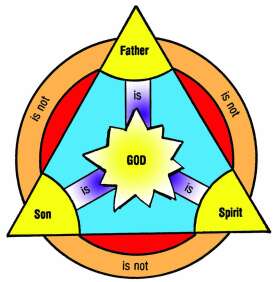Feedback archive → Feedback 2013
Do Christians worship the one and only God?

D.H. from Canada writes:
I know this isn’t science related but I’m hoping you guys can help me. I’ve been a Christian for a long time and I thought I knew how to answer most questions. Because of your ministry I can argue quite well against evolution and atheism. But today I was asked the most basic question of all, and I couldn’t answer it in a way that satisfied even myself. After pointing out that the other gods people worshiped were either man made or demons posing as gods, he asked how I knew I was worshiping the true God. I assume he worshiped a different god and wanted to know what made my God different. Aside from a personal experience of God, I couldn’t answer him. And really, if I was following the wrong god, couldn’t I have a personal experience of the wrong God? I’m not worried that I am, I’m worried that I can’t answer that.
I respect you guys and your knowledge of the Bible, so I hope that you are able to help.
Thank you.
Lita Sanders replies:
Dear D.,
Thanks for writing in. This is actually an important question: How do we know we worship the true God? We stake our eternal destiny and live our lives based on our fundamental belief that the Bible tells us who God is and how we should worship Him and live in relation to Him. So what evidence do we have that it is true (and thus, that the God the Bible reveals is the true God)?
First, the Bible is an incredibly accurate historical record. Over and over, people, places, and events that only it attested to have been corroborated by mainstream archaeology. At the very least, it is on par with other ancient records (and we would argue it is quite a bit more than that!). Second, it is internally consistent, which is remarkable considering that its 66 books were written by different people in different circumstances separated by centuries and cultures. Consider: Moses, the Egyptian prince turned shepherd, agrees with the fisherman Peter and the career prophet Isaiah. The tax collector Matthew agrees with the Pharisee-turned-evangelist Paul. In all these divergent individuals, we don’t get errors cropping in–for instance, Egyptian medical superstition or the Pharisees’ oral tradition, or just common misconceptions of their day that were shared among ancient cultures.
But I think Jesus is the best witness we have. We know that the Gospels were written too soon after the events to have been fabricated; there were many witnesses still living when the Gospels were written and began to circulate; the location of His tomb would have still been common knowledge, and people would have known if there was a body in it. Jesus corroborated Scripture at every point, and pointed people to what had been written. Most of His teaching was not totally new, but based on the logical outcome of a belief and practice of what God had already revealed in the light of the coming Kingdom of God. And Jesus did what no one else in history has done; He was resurrected in a body that will never die again. This serves as the ultimate authentication of His claims, because God would never resurrect someone like that who was a liar or a false witness. And if Jesus’ claims are true, as His resurrection shows, then we can also trust His teachings, and His promise that we will be resurrected at His second coming.
I hope these few thoughts are helpful.
Sincerely,
Lita Sanders



Readers’ comments
Comments are automatically closed 14 days after publication.